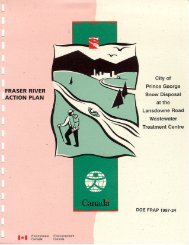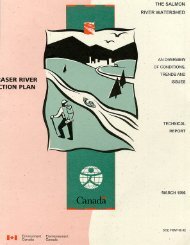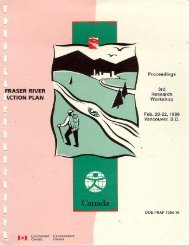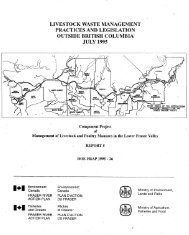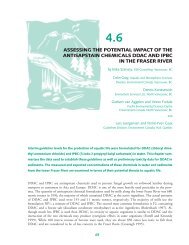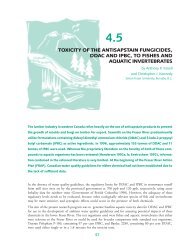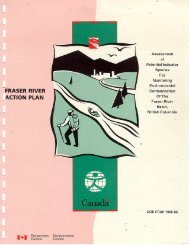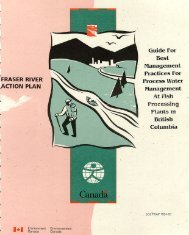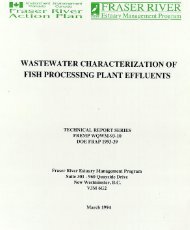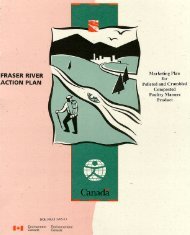A Spill Risk Assessment of the Enbridge Northern Gateway Project
A Spill Risk Assessment of the Enbridge Northern Gateway Project
A Spill Risk Assessment of the Enbridge Northern Gateway Project
You also want an ePaper? Increase the reach of your titles
YUMPU automatically turns print PDFs into web optimized ePapers that Google loves.
anging between 16 and 20 years 22 are over 2.5 times higher compared to tankers<br />
aged 11 to 15 years and over 4 times higher compared to tankers aged 6 to 10<br />
years. In 2009, <strong>the</strong> authors estimate that <strong>the</strong> average age <strong>of</strong> double hull tankers in<br />
<strong>the</strong> worldwide operational fleet was between 4 and 8 years. Papanikolaou et al.<br />
(2009) estimate that, due to <strong>the</strong> young age <strong>of</strong> <strong>the</strong> worldwide tanker fleet, non-‐<br />
accidental structural failures could become significant after 2020, which is <strong>the</strong> date<br />
that ENGP plans to be in full operation. Thus, historical incident frequency data<br />
from <strong>the</strong> LRFP database may underestimate future incident rates for non-‐<br />
accidental structural failures for ENGP tankers since <strong>the</strong> methodological approach<br />
in <strong>the</strong> QRA does not consider <strong>the</strong> likely increase in double-‐hull tanker age during<br />
<strong>the</strong> operating period <strong>of</strong> <strong>the</strong> ENGP.<br />
In summary, DNV’s methodology should differentiate tanker incidents and spill<br />
rates among <strong>the</strong> different tanker classes and different tanker ages. Failure to<br />
consider different vessel characteristics results in a potential underestimate <strong>of</strong><br />
future tanker accidents.<br />
Evaluation: There are five major deficiencies related to <strong>the</strong> reasonableness criterion and<br />
thus this criterion is not met.<br />
Reliability<br />
Reliability: Appropriate analytical methods explicitly describe and evaluate sources <strong>of</strong><br />
uncertainty and variability that affect risk, and estimate <strong>the</strong> magnitudes <strong>of</strong> uncertainties<br />
and <strong>the</strong>ir effects on estimates <strong>of</strong> risk.<br />
The methodological approach estimating spill return periods in <strong>the</strong> ENGP regulatory<br />
application contains two major deficiencies related to <strong>the</strong> reliability criterion:<br />
1. Lack <strong>of</strong> confidence intervals that communicate uncertainty and variability in spill<br />
estimates for tanker, terminal, and pipeline operations<br />
The methodologies estimating tanker, terminal, and pipeline spills for <strong>the</strong> ENGP<br />
fail to provide confidence intervals that characterize and communicate uncertainty<br />
and variability. There are no confidence intervals for any <strong>of</strong> <strong>the</strong> spill estimates or<br />
failure frequencies in Volume 7B, Volume 8C, <strong>the</strong> TERMPOL Study, <strong>the</strong> marine<br />
shipping QRA prepared by DNV, <strong>the</strong> Bercha Group (2012a; 2012b; 2012c) studies,<br />
or <strong>the</strong> WorleyParsons (2012) report. Since confidence intervals provide a measure<br />
<strong>of</strong> <strong>the</strong> precision <strong>of</strong> a calculated value and describe <strong>the</strong> uncertainty surrounding an<br />
estimate, <strong>the</strong> absence <strong>of</strong> confidence understates <strong>the</strong> degree <strong>of</strong> risk. Failure to<br />
present confidence intervals implies that <strong>the</strong>re is little or no uncertainty in spill<br />
estimates and provides a false sense <strong>of</strong> confidence in <strong>the</strong> results. Thus spill<br />
estimates for <strong>the</strong> ENGP fail to provide a measure <strong>of</strong> precision, fail to communicate<br />
uncertainty in spill-‐related data, and potentially mislead decision-‐makers to<br />
presume that <strong>the</strong>re is certainty in <strong>the</strong> estimates even though this is not <strong>the</strong> case.<br />
22 <strong>Enbridge</strong> has stated that it will not use tankers over 20 years <strong>of</strong> age in an effort to prevent hydrocarbon<br />
spills (<strong>Enbridge</strong> 2010c).<br />
37



